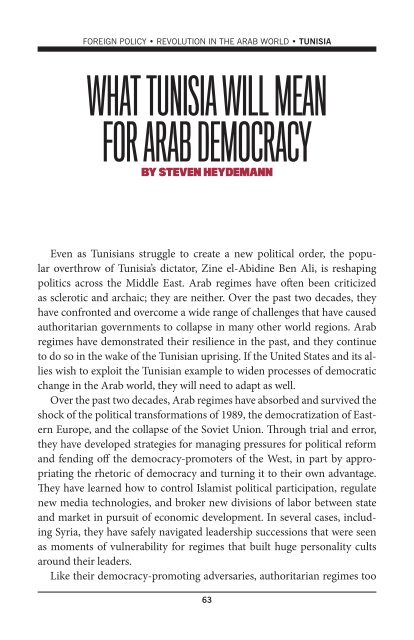Revolution in the Arab World - Observation of a lost soul Blog
Revolution in the Arab World - Observation of a lost soul Blog
Revolution in the Arab World - Observation of a lost soul Blog
You also want an ePaper? Increase the reach of your titles
YUMPU automatically turns print PDFs into web optimized ePapers that Google loves.
foreign policy • revolution <strong>in</strong> <strong>the</strong> arab world • TUnisia<br />
What Tunisia Will Mean<br />
for <strong>Arab</strong> Democracy<br />
BY STEVEN HEYDEMANN<br />
Even as Tunisians struggle to create a new political order, <strong>the</strong> popular<br />
overthrow <strong>of</strong> Tunisia’s dictator, Z<strong>in</strong>e el-Abid<strong>in</strong>e Ben Ali, is reshap<strong>in</strong>g<br />
politics across <strong>the</strong> Middle East. <strong>Arab</strong> regimes have <strong>of</strong>ten been criticized<br />
as sclerotic and archaic; <strong>the</strong>y are nei<strong>the</strong>r. Over <strong>the</strong> past two decades, <strong>the</strong>y<br />
have confronted and overcome a wide range <strong>of</strong> challenges that have caused<br />
authoritarian governments to collapse <strong>in</strong> many o<strong>the</strong>r world regions. <strong>Arab</strong><br />
regimes have demonstrated <strong>the</strong>ir resilience <strong>in</strong> <strong>the</strong> past, and <strong>the</strong>y cont<strong>in</strong>ue<br />
to do so <strong>in</strong> <strong>the</strong> wake <strong>of</strong> <strong>the</strong> Tunisian upris<strong>in</strong>g. If <strong>the</strong> United States and its allies<br />
wish to exploit <strong>the</strong> Tunisian example to widen processes <strong>of</strong> democratic<br />
change <strong>in</strong> <strong>the</strong> <strong>Arab</strong> world, <strong>the</strong>y will need to adapt as well.<br />
Over <strong>the</strong> past two decades, <strong>Arab</strong> regimes have absorbed and survived <strong>the</strong><br />
shock <strong>of</strong> <strong>the</strong> political transformations <strong>of</strong> 1989, <strong>the</strong> democratization <strong>of</strong> Eastern<br />
Europe, and <strong>the</strong> collapse <strong>of</strong> <strong>the</strong> Soviet Union. Through trial and error,<br />
<strong>the</strong>y have developed strategies for manag<strong>in</strong>g pressures for political reform<br />
and fend<strong>in</strong>g <strong>of</strong>f <strong>the</strong> democracy-promoters <strong>of</strong> <strong>the</strong> West, <strong>in</strong> part by appropriat<strong>in</strong>g<br />
<strong>the</strong> rhetoric <strong>of</strong> democracy and turn<strong>in</strong>g it to <strong>the</strong>ir own advantage.<br />
They have learned how to control Islamist political participation, regulate<br />
new media technologies, and broker new divisions <strong>of</strong> labor between state<br />
and market <strong>in</strong> pursuit <strong>of</strong> economic development. In several cases, <strong>in</strong>clud<strong>in</strong>g<br />
Syria, <strong>the</strong>y have safely navigated leadership successions that were seen<br />
as moments <strong>of</strong> vulnerability for regimes that built huge personality cults<br />
around <strong>the</strong>ir leaders.<br />
Like <strong>the</strong>ir democracy-promot<strong>in</strong>g adversaries, authoritarian regimes too<br />
63




